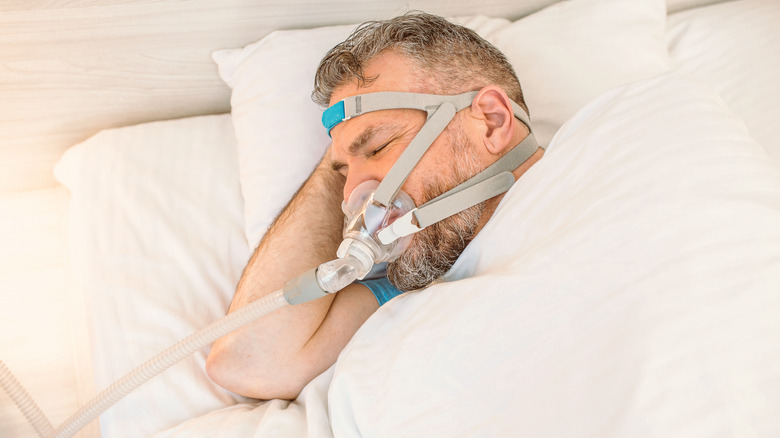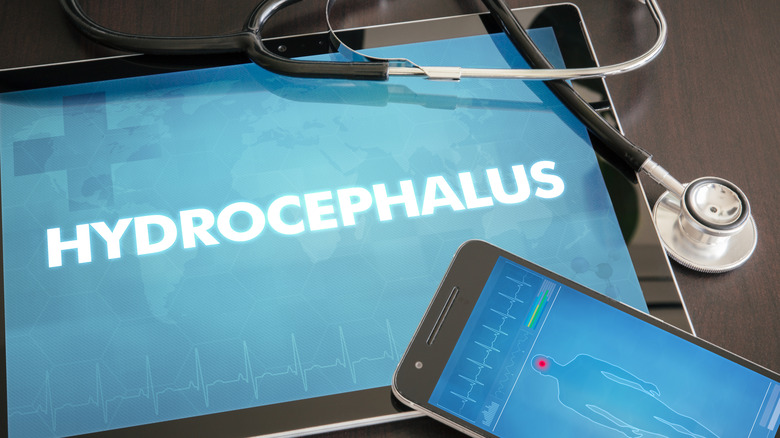Medical Problems That May Resemble Dementia Symptoms
Dementia can be frightening, both for the person experiencing it and for the people who love them. According to the National Institute on Aging, it can affect a person's ability to think, remember, and reason to a degree that interferes with their daily functioning. It can also affect a person's emotions and change their personality. So if you, or someone you care about, have become forgetful or feel confused, it can be a cause for concern.
While there is no cure for dementia, the good news is that not every person who has dementia-like symptoms actually has it. The American Association of Retired Persons (AARP) states that there are many different conditions that can mimic dementia. The National Institute on Aging notes that doctors should conduct a full assessment in order to uncover or rule out these conditions. As Cleveland Clinic points out, symptoms may be reversible with proper treatment, depending on their cause. A visit to your primary care provider is a good starting place.
Some of the more common conditions that can give the appearance of dementia, according to the AARP, are medication interactions or side effects, infections, sleep problems, dehydration, and normal pressure hydrocephalus.
Medication interactions or side effects
As people age, it becomes more common that they may be taking more than one medication. In fact, Healthline notes that more than four in 10 older adults are taking five or more prescription drugs a day. With more medications, however, comes a greater risk for drug interactions and side effects. People may experience adverse drug reactions such as sleepiness, confusion, or worsening gait or balance. This can leave people in what they refer to as a "medication fog," mimicking the symptoms of dementia.
This occurs, they say, because aging kidneys are less able to excrete medications. Also, our brains are less able to counteract the cognitive effects of medications as we grow older.
The most common offenders are pain medications, sleep medications, anticholinergic medications, antidepressants, and other psychotropic medications. However, among these, the anticholinergic class of medications may be the worst. Verywell Health explains that these medications block a chemical messenger called acetylcholine which allows nerves to communicate with certain organs and muscles in your body. They may be used to treat a variety of conditions, including asthma, urinary incontinence, and motion sickness.
According to Healthline, your doctor may prescribe alternative medications if you are experiencing or concerned about side effects.
Infections
AARP states that certain infections, such as COVID-19 and urinary tract infections (UTIs), may cause people to experience delirium, which can resemble dementia. They describe delirium as "a sudden change in alertness, attention, memory and orientation." These symptoms resemble dementia; however, they tend to come on quickly whereas dementia has a gradual onset.
They explain that when you have an infection, white blood cells are sent to fight the invading organism. This can create chemical changes in the brain that cause people to feel sleepy or confused and unfocused.
AARP notes that infections in older adults can be more difficult to diagnose. They may not present with the typical symptoms that are associated with an infection. For example, older people with COVID-19 may not have telltale symptoms like a fever or cough. It is important for people to be aware of this because infections can generally be treated following proper diagnosis.
Sleep problems
Sleep problems are very common in aging adults. AARP reports that as many as 30 to 48% of older people have insomnia. If you are not getting good quality sleep, however, this can lead to symptoms that look like dementia, including problems with concentration, confusion, fatigue, and irritability.
Another sleep issue that people may have is sleep apnea. This condition involves repeated episodes in which a person stops breathing during sleep, or is not breathing as well as they should be, says WebMD. This deprives the brain of oxygen and may eventually cause long-term damage if not treated.
If you snore loudly, sometimes wake up gasping for air, have uncontrolled high blood pressure, or have a dry mouth or headache when you wake up, these could be signs that you have sleep apnea, so be sure to tell your doctor. Treating sleep apnea with a continuous positive airway pressure machine (CPAP) can alleviate symptoms, notes AARP.
Dehydration
AFFIRMATIVhealth writes that adequate water intake is very important to health. It helps clear toxins out of the body, aids digestion, keeps your complexion clear, prevents headaches, and helps with your immune system. It is also important in keeping the brain functioning well.
However, if people aren't taking in enough water through drinking and eating, they may become dehydrated. Those over 60 are especially prone to not drinking enough, they explain. People with memory issues may simply forget to drink. Also, certain commonly used medications function as diuretics, and may make people lose more water through urination. In addition, people with urinary incontinence may begin to avoid drinking liquids in order to ward off possible bathroom accidents.
Dehydration can cause dizziness, confusion, and fatigue, making it resemble dementia. If a person also has symptoms like headache; infrequent urination; dark-colored and smelly urine; sunken eyes; dry skin, mouth, and lips; increased heart rate; and low blood pressure, dehydration may very well be the culprit.
Normal pressure hydrocephalus
The Alzheimer's Association says normal pressure hydrocephalus (NPH) is a brain disorder in which too much cerebrospinal fluid (CSF) collects in the brain's ventricles. This may be due to tumors, head injury, bleeding, infection, inflammation, or other causes. It can impinge on nearby tissues, leading to cognitive issues.
NPH mainly affects people in their sixties and seventies, they write. They estimate that around 700,000 people have this condition; however, about 80% of the time, it gets misdiagnosed as another condition such as Alzheimer's or Parkinson's disease.
It can be treated by inserting a tube called a shunt to remove the excess fluid, according to AARP, which can bring about a dramatic improvement in symptoms. This makes awareness and a proper diagnosis very important. The hallmark symptoms that you should know include problems with walking that resemble how a person might walk on a boat, mild dementia, problems with thinking, and loss of bladder control.





